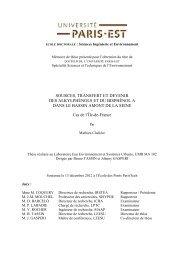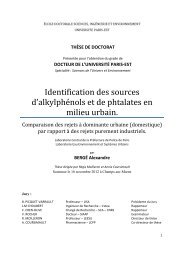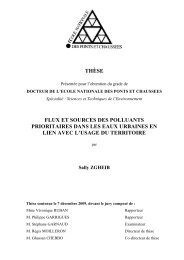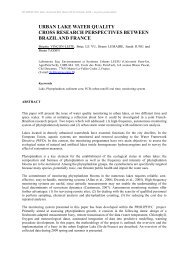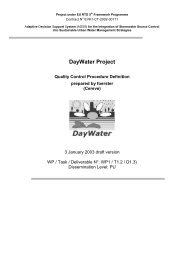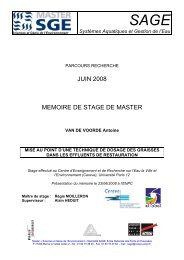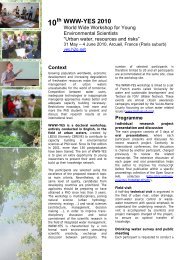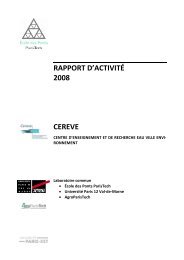This work’s aim is to analyse the interaction between local policies of water accessibilitymanagement and international decentralized cooperation and its consequences on urbanterritories organization and water access improvement. Decentralized cooperation refers to theinternational action of local governments in North/South or South/South exchanges andprojects run by international NGO subsidized by local governments.Method and hypothesisOur work will consist in analysing this frame of action where speeches and practices on urbanareas are in perpetual evolution, to see how the actors situated at different levels ofintervention, going of the international to the premises, coordinate their strategies to produce apolicy tending to resolve the imbalance existing in the access to the drinking water on urbansegregated territories (Baron, 2006).It will also ask how local actors appropriate, adapt or throw back imported models so called "ready to manage " by Dubresson (1993), proposed by donors (IMF, World Bank) or localpartners in the North, but their efficiency leaves sceptic some (Damiba, 1996).The research method includes a bibliographic review, official documents analysis, interviewsand questionnaires to relevant actors. The expected result is an evaluation of decentralizedcooperation stakes and above all a discussion on new opportunities of collaboration betweendeveloped countries local governments and those of developing countries in urban servicesimprovement, especially water accessibility.We shall try to report this phenomenon through the literature of these last twenty years on theproblem of the access to the urban services in developing countries, in Africa in particular,their stakes in spatial engineering (Jaglin, 2004) and of reorganization of the urban space insearch of a " good urban governance " (Baron, 2006); but also the modalities of pricedetermination of the water which, for some, has to be made by the market to reflect the realcost of the water and allow an effective allocation of the resources (Thobani, 1995;Camedessus, 2003), whereas for the others (Shiva, 2003) this trade drift is on the base of thedisparities in access to water services which must be considered as a public good (Patrella, on2003; on 2004).Participatory mechanisms will be analysed in their implementation in the context of the dailyways that communities (NGO’s and users association) organize themselves and localgovernments international cooperation practices for water management. The goal is to identifynew ways of collective action and new institutional organization that make it possible tointegrate decentralized cooperation in water issues solution.We shall try to confirm or deny certain assumptions in this work:- Does decentralized cooperation at the same time it allows communities to improve thewater access management is not going to be a way of accentuation of existingdisparities between urban spaces and populations, on territories already characterizedby an mosaic form of organization (Baron, 2006)?- How the decentralized governments, within the support of international cooperation,can improve the participation of the local actors (who have a deeper insight ofpopulations’ difficulties) in establishing a solution to the problems of access to water ina " bottom up " model?Evolution of water sector policiesThe reforms that followed the structural adjustment policies lead to the end of free service inwater and national government’s subsidizes. This change in the management of drinking waterservices in developing countries joined the concerns of the World Bank which considers withinthe framework of Global Water Partnership that water is an economic good that it is necessaryto value and to distribute by taking into account granted investments and profits removed fromequipments.The International Conference on Water and Environment (Dublin 1992) stated: "for all itsdifferent uses, water has an economic value and should be recognized as an economic good".According to this report, "the non-recognition in the past of the economic value of water droveto wasting and harmful practices for the environment of the resource…."It’s on the basis of this principle that developing countries led changes in their water policieswith the establishment of public-private partnerships (PPP).The emergence of a new model of public managementThe "depressed" context of post-Washington consensus (Petiteville, 1995) in developingcountries allowed to local authorities the opportunity to put in profit their new attributions inforeign actions and engage North/South decentralized cooperation relationships.The increasing openness of the international relations to non-governmental actors (after the fallof Berlin Wall) and the broadcasting of decentralization model as well as in northern andsouthern countries participated to the spread of decentralized cooperation [example: FrenchLaw of 1992 that legitimised international actions of local authorities and Britain’s "Localgovernment overseas assistance" Law in 1993]. These legal devices will permit localgovernments to become more emancipated from national authorities and to set up economicstrategies in their field of competence.In Africa, the trend towards decentralization is carried by International organizations such asWorld bank to ensure on one hand a more efficient management of public services and on theother hand to reduce public deficits by transferring at the same moment some revenue andexpenses to local authorities.In a context of spreading of "local governance" concepts (World Bank, on 1992), severalAfrican countries under structural adjustments constraints subscribed to this model heavilyrecommended by international financial partners; that will be the case of Mali (by a law ofFebruary 11th, 1993 determining conditions of the free administration of regions and theirautonomy) and Senegal by the adoption of Local Government Code in 1996.It is important to wonder about the impact of transformations intervened since the early 90's(which are ongoing) both in speeches and practices on the urban territories in developingcountries, especially dealing with water sector.This period (the 90s) is also that of the circulation of a "hybrid" model of public management:the New public management, which associates public and private stakeholders in publicprivatepartnerships (PPP). The generalization of this model is going to follow in theimportance, which was given - at the end of the year’s 80- to the participation of users in costsrecovering of water services and in commons generally. Thus, international community inNew Delhi (1990) and Dublin (1992) conferences on water and environmental stated: The diversification of services (a little for all is better than a lot for little) The association of users and decision-makers at all levels of decision The end of the free services, giving the water an economic value…It’s in this circumstance that at the World Water Forum in Kyoto (2003) public assistance isput at the centre of improvement of water policies, especially in developing countries. Afterthe market regulation and less state model advocated in the 90s shown its limits, it wasWWW-YES 2008, Paris 13 – 16 May 2008 113WWW-YES 2008, Paris 13 – 16 May 2008 114
necessary to find a balance between the market and the State (or the decentralizedcommunities) to assure fair access water for populations, particularly for the poor. Accordingto the recommendations of the Forum, this solution has to go through a strengthening ofinternational solidarity that must be manifested by the development of decentralizedcooperation in water sector, support NGOs and associations’ actions, and Private sectorengaged in developing countries.Decentralized cooperation and water services management improvementTo us, decentralized cooperation can help local authorities of developing countries to reinforcetheir management capacities, especially in water services supply for poorest citizens.For example in France, local governments have already competences in the management ofurban services and space too. And in the frame of Oudin Law (2005), which allow them toengage international actions in water access and sanitation programmes, they can helpdeveloping countries local authorities to improve their technical and political skills in urbanterritories management.We will try to show how decentralized cooperation can help northern countries, localauthorities especially, to anticipate on problems that they might face in the future, as waterresources allocation will generate more and more competition between territories andpopulations usage (household, industries, agriculture…).According to Graham and Marvin (2001) splintering urbanism is a consequence of the lessstate model that strengthens urban networks fragmentation and the failure of state regulation.Decentralized cooperation, bye the close relations it creates between partners can helpdeveloping countries to overcome these issues and lead toward social and spatial equilibriumin cities services access, especially drinkable water.CONCLUSIONWater access services is one of the most discussed issue in international meetings nowadays.This research tries to bring a new comprehension of international practices in watermanagement, especially how developing countries can improve their urban management toguarantee a fair access to water services.By the combination of theoretic framework (collective action and institutions economics) wewill discuss the consequences of decentralised cooperation in urban services management indeveloping countries. We also try to show how decentralized cooperation can favour theemergence of new collective action both at local and international scales.In this research we assume that to ensure fair access to drinkable water at low cost (as declinedin the Millennium Development Goals) to urban population, it should be necessary to strengthlocal actors “capabilities” (in the sense of Amartya Sen, 2000) so that local governmentswould be able to regulate socio-spatial organization of urban services, access to water inparticular. For us, public-private partnership model has shown its limits and a new model witha stronger role for public institutions is essential to ensure social investment and spatialequilibrium.The results of ongoing research (literature review, interviews and land practices observation)will allow us to confirm or deny our presumptions.REFERENCESBaron C., 2006, Mutations institutionnelles et recomposition des territoires urbains enAfrique : une analyse à travers la problématique de l’accès à l’eau, Revues DéveloppementDurable&Territoires, septembre http://developpementdurable.revues.org/document2940.htmlBreuil L., 2004, « Renouveler le partenariat public-privé pour les services d’eau dans les paysen développement » (Comment conjuguer les dimensions contractuelles, institutionnelles etparticipatives de la gouvernance ?), Thèse en Sciences de Gestion, ENGREF, sous la directionde M. Nakhla, 22 novembre.Camdessus M., 2003, « Rapport du groupe de travail international sur le financement desinfrastructures mondiales d’accès à l’eau », Paris, (Traduction française de : Report of theWorld Panel on Financing Water Infrastructure, 2003, "Financing Water for All", World WaterCouncil, Chaired by M. Camdessus, Written by J. Winpenny, March)Cissé Arona, 2006, « Partenariat public-privé et gouvernance dans la gestion de l’eau :quelles pratiques au Sénégal entre 1996 et 2006 ? », Mémoire de master SystémiqueComplexe Appliquée aux Territoires, Université Toulouse 1, sous la direction de CatherineBaron et Jérôme Ferret, septembre.Commons, J.R., 1970, The Economics of Collective Action, Madison, The University ofWisconsin Press.Commons, J.R., 1934, Institutionnal Economics. Its place in Political Economy, McMillanCompany.Dubresson A., Raison J-P, 1998, L’Afrique subsaharienne. Une géographie du changement,Paris, Masson.Jaglin S., Dubresson A. (dirs), 1993, Pouvoirs et cités en Afrique noire. Décentralisations enquestions, Paris, Karthala.Jaglin S., 2001, L’eau potable dans les villes en développement : les modèles marchands faceà la pauvreté, In « Les nouvelles politiques de l’eau : enjeux urbains, ruraux, régionaux »,Revue Tiers Monde, n° 166, avril- juin.Jaglin S., 2004, « Les services d’eau urbains en Afrique subsaharienne : vers une ingénieriespatiale de la diversité ? », Communication au N-AERUS annual conference, Barcelone 16-17septembre.Pétrella R., (2004), L'eau, bien commun public. Alternatives à la « pétrolisation » de l'eau,Editions de l'Aube.Pétrella R. (Dir), 2003, L’eau : Res publica ou marchandise ?, Paris, la Dispute.Petit Olivier, 2002, « De la coordination des actions individuelles aux formes de l’actioncollective : une exploration des modes de gouvernance des eaux souterraines », Thèse dedoctorat en Sciences Economiques, sous la direction de Sylvie Faucheux, Université deVersailles-Saint Quentin en Yvelines, décembre.Petiteville F., 1996, La coopération décentralisée. Les collectivités locales dans la coopérationNord-Sud, Paris, l’Harmattan.Sen A., 2000, Un nouveau modèle économique – développement, justice, liberté –, Paris,Odile Jacob.Shiva V., 2003, La guerre de l'eau (Privatisation, pollution, profit), Paris, Ed. L'Aventurine.Stewart J., 2000, The nature of british local government, MacMillan, London.Stocker Gerry, 2006, Public value management: a narrative for networked governance?, TheAmerican Review of Administration, march, pp 41-57.Thobani M., 1995, Tradable Property Rights to Water. How to improve water use and resolvewater conflicts, Public Policy for the Private Sector, February.World Bank, 1992, Governance and Development, Washington D.C., Oxford Univ. Press.World Bank, 2003, Water resources sector strategy: strategic directions for World Bankengagement, Washington DC, February.World Water Council, 2003, "World Water Actions", Report of the Third World WaterForum in Kyoto, March.WWW-YES 2008, Paris 13 – 16 May 2008 115WWW-YES 2008, Paris 13 – 16 May 2008 116


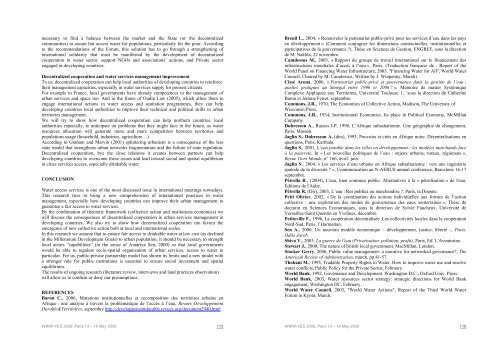
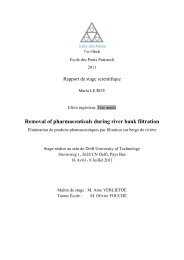
![[pastel-00730831, v1] Incidence des pratiques d'entretien ... - LEESU](https://img.yumpu.com/50938896/1/184x260/pastel-00730831-v1-incidence-des-pratiques-dentretien-leesu.jpg?quality=85)
